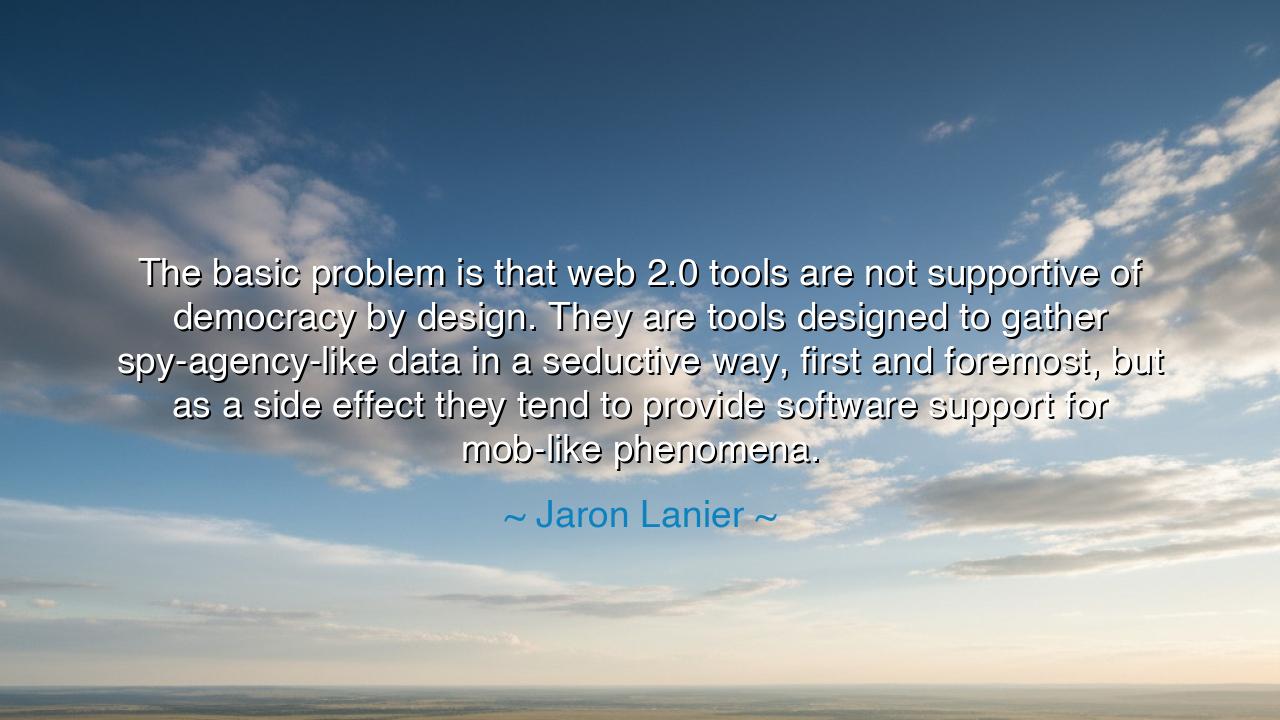
The basic problem is that web 2.0 tools are not supportive of
The basic problem is that web 2.0 tools are not supportive of democracy by design. They are tools designed to gather spy-agency-like data in a seductive way, first and foremost, but as a side effect they tend to provide software support for mob-like phenomena.






“The basic problem is that web 2.0 tools are not supportive of democracy by design. They are tools designed to gather spy-agency-like data in a seductive way, first and foremost, but as a side effect they tend to provide software support for mob-like phenomena.” — Jaron Lanier
Thus spoke Jaron Lanier, one of the earliest architects of the digital age, yet also one of its fiercest prophets. He warned mankind that the glowing screens we cradle in our hands are not mere toys of convenience, but engines of influence, born not from the spirit of liberty, but from the hunger for control. In these words, he reveals the tragic paradox of the modern age: that Web 2.0, the world of social media and open platforms, promised freedom and unity, yet often delivered surveillance and division. What began as a tool of connection became, in time, an invisible net, woven with threads of data and desire.
When Lanier speaks of tools “not supportive of democracy by design,” he points to a deep and troubling truth — that the shape of a tool determines the shape of its user. The technologies that define our age were not crafted to uplift truth or nurture dialogue; they were forged in the fires of commerce and control. Each click, each scroll, each fleeting glance is recorded, studied, and monetized, until human beings become the product and not the customer. Democracy, which depends upon free thought and deliberation, cannot thrive in a marketplace where attention is bought and sold like grain.
And yet, the peril runs deeper still. Lanier warns that these systems “provide software support for mob-like phenomena.” For what is a mob but a mirror of unexamined emotion — the fury of the many, unrestrained by reason or compassion? Social networks, built upon algorithms that reward outrage, amplify the loudest voices and silence the thoughtful ones. They feed the tribal instinct, magnify division, and cloak it in the illusion of community. Thus, in the digital square where all may speak, fewer truly listen. And in the din of endless noise, the spirit of democracy — patient, deliberative, slow — is drowned beneath the thunder of instant judgment.
Consider the lesson of ancient Athens, the birthplace of democracy. There, the agora was a place of gathering, of debate, of persuasion through speech and logic. But when the crowd grew unruly, when emotion overcame reason, it led to disaster — the condemnation of Socrates, the fall of justice to the will of the mob. The same pattern, Lanier tells us, has been reborn in our own age. The digital agora, vast and borderless, has given rise to countless modern mobs — movements of fury, outrage, and misinformation, quick to destroy but slow to understand. The tragedy is not that the people have found their voice, but that they have forgotten how to use it wisely.
Lanier’s warning is not a rejection of technology, but a call to wisdom. He reminds us that tools are never neutral — they carry within them the intent of their makers. If the architects of Web 2.0 built systems to extract attention, then those systems will always serve manipulation over meaning. But the fault, too, lies in the human heart — for we have traded depth for distraction, reflection for reaction. The ancient philosophers spoke of the virtue of moderation; Lanier reawakens that teaching in a new age. The power of the digital world must be guided by ethics, by human values, and by the will to protect truth from the seductions of convenience.
So, my children, learn this from Lanier’s wisdom: be not slaves to your devices. Let your mind be the master of the screen, not its servant. Question what you read. Seek truth beyond the algorithm’s reach. Speak, but also listen. Share, but with discernment. For democracy lives not in the machines of men, but in the hearts of the free — and if those hearts are captured by illusion, freedom itself becomes a memory.
Thus, the teaching endures: every age forges its own idols, and ours are made of data and light. But remember, as the ancients knew, that true power lies not in the tools of the world, but in the virtue of the soul. Use these tools wisely, with courage and compassion, and they may yet serve the cause of liberty. Forget Lanier’s warning, and they shall serve only the shadow — a glittering tyranny born not of kings, but of code.






AAdministratorAdministrator
Welcome, honored guests. Please leave a comment, we will respond soon